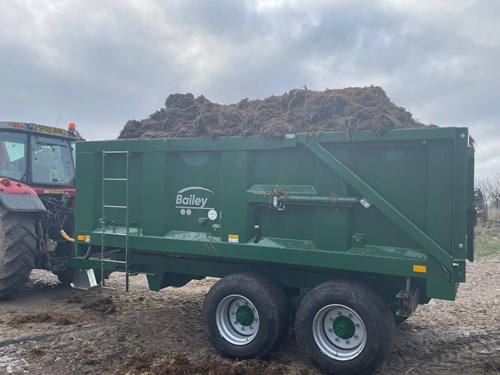Trading Straw for Farmyard Manure

Straw for muck exchanges can bring mutual gains for livestock and arable farmers. The arable business provides straw for bedding and in return receives farmyard manure (FYM). For many arable and livestock farmers operating near each other, it makes sense to come to an arrangement whereby straw is traded for FYM. Historically, deals have been informal amongst neighbouring businesses, however formal agreements are becoming commonplace due to the increased regulation and the increased value of manure as a fertiliser and soil improver.
The arable business provides straw for bedding and, in return, can integrate organic manure into the soils it uses for crop production, while the livestock farm has an outlet for nutrients over and above its own requirements.
For the arable farmer a straw for muck deal allows for organic manure to be integrated into soils, helping to improve soil health and crop production. In most cases, applying muck can help to reduce the need and reliance on artificial fertilisers. Organic manures are a valuable source of N, P & K, trace elements and organic matter.
For the livestock farmer a straw for muck deal can provide an outlet for excess manure over and above their own requirements. Importantly it guarantees a reliable source of livestock bedding, which in many cases works out to be less expensive than buying the straw.
Who is Responsible for What?
Who is responsible for baling and spreading etc. varies on a farm-to-farm basis and will largely depend on logistics e.g. who has the flexibility and the machinery and labour.
When drawing up a formal agreement the following operations and costs should be clearly defined as to which party is responsible for.
- Baling the straw
- Loading and hauling the straw to the livestock farm
- Mucking out the livestock buildings
- Hauling the manure back to the fields
- Spreading the manure
It is important to consider the logistics for example straw should be removed in a timely manner to allow the arable farmer to establish following crops. Good communication is key between both parties to ensure appropriate planning and to ensure fields are prioritised that have a winter crop following to reduce the risk of straw being left sat out in the field.
A key consideration to any agreement for the arable farmer is the potential to introduce weeds if straw is used from other sources. To alleviate this most arable farmers will stipulate that their clean straw goes to a livestock farm and in exchange it will only have the muck back from that farm.
FYM is often an undervalued resource. While the nutrient values of artificial fertilisers are readily obvious by how they are named e.g. 20.10.10, the nutrient value of organic fertilisers is often overlooked. Understanding the nutrient value of both straw and the FYM in terms of nutrients removed and applied back helps to form the basis of a fair exchange.
The table below shows the approximate nutritive values of straw and cattle FYM, using fertiliser figures from AHDB August 2025 for nitrogen, phosphate and phosphorus.

Once you have worked out the nutrient value of the straw and FYM, it is possible to calculate the relative quantity of manure to exchange. An example is shown below where straw has been made available in the row at current market values (AHDB) £60/ton straw and then a best estimate of straw yield, in this case 1.6t/ac.

In the worked example 6.5 tonnes of FYM is exchanged for every ton of straw is appropriate including a guide value for organic matter. The ratio will vary depending on fluctuations in fertiliser prices, straw prices and straw yield but the principal still applies. You can further adjust the cost to each party depending on who is incurring baling costs and any other relative costs to the agreement.
Five Top Tips
- Ensure that a formal signed agreement is in place to safeguard both parties.
- Cleary define who is responsible for what e.g. baling.
- Consider getting the FYM analysed to know the availability of nutrients for a fairer exchange.
- Remember that exchange ratios will vary relative to fertiliser prices, straw yields and seasonal straw prices.
- Ensure you have a backup plan for bad weather.
Fiona Thomson, Area Manager & Senior Consultant, Fiona.Thomson@sac.co.uk

Unearthed is the exclusive SAC Consulting members' monthly newsletter. Unearthed offers insights and tips from our experts on what we think is in store for farming and crofting in the coming months in order to protect and enhance your business.
Posted by Unearthed News on 14/10/2025
